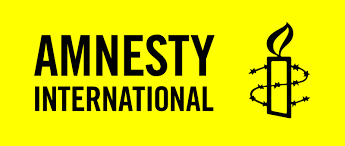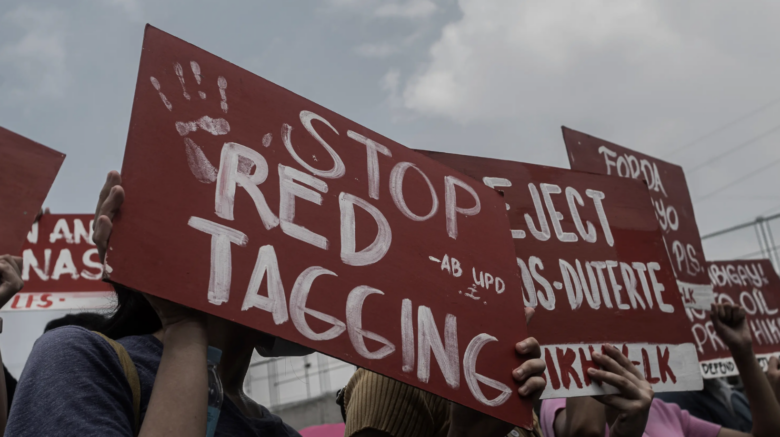AUTHOR: Antía Kornführer Romay
The administrations of both the former President of the Philippines Rodrigo Duterte (2016-2022) and the current President Ferdinand (‘Bongbong’) Marcos Jr. (2022-present) have used digital platforms to spread misinformation and introduced vague anti-terror laws to target, discourage, and ultimately undermine the efforts of young human rights defenders in the Philippines.
The main tactic behind the state-sponsored political violence is the practice of ‘red-tagging’ which intensified in 2018, fueling violence and discrimination against young advocates involved in diverse human rights causes. This strategy essentially fosters a climate of fear and intimidation, undermining human rights advocacy and silencing dissent.
What happened in 2018?
In 2018, former President Rodrigo Duterte introduced Executive Order 70, essentially implementing a ‘Whole-of-Nation’ strategy to address Local Communist T error Groups. A central element of this directive was establishing a new presidential task force, the National Task Force to End Local Communist Armed Conflict, also referred to as NTF-ELCAC
Red-tagging, a practice that dates back to the beginning of the armed conflict between the Philippine government and the New People’s Army (NPA), a communist armed group active in the Philippines since 1969, intensified following the introduction of the NTF-ELCAC. This development marked the start of a new wave of red-tagging, which was essentially accompanied by threats and harassment targeting human rights defenders and other groups, who were perceived to be affiliated with communist armed groups.
What is Red-Tagging?
In the Philippine context, “red-tagging” essentially refers to a tactic used by political figures and state security forces to publicly vilify human rights defenders, student activists and others, as members of and recruiters for the New People’s Army. This approach has been employed to ultimately portray peaceful activism and left-leaning political thinking as acts of rebellion or terrorism.
Red-tagging has been used by authorities and political leaders as a tool to harass and intimidate human rights defenders, frequently stirring violence against those targeted. This tactic specifically and strategically focuses on young human rights defenders, thereby essentially recognizing the important role student protests have played in the Philippines’ modern history in resisting and challenging oppression and human rights abuses. In addition to predominantly targeting young human rights defenders, red-tagging also disproportionately affects women, LGBTQIA+ individuals, and Indigenous People.
With the rise of online activism, especially during the protests against the Anti-T errorism Act in 2020 amidst the Covid-19 quarantine measures, online red-tagging has also significantly increased. Facebook, which is the most commonly used social media platform in the Philippines, has thereby become the NTF-ELCAC’s key tool for spreading its messages. Consequently, red-tagging posts on Facebook has become a cost-effective and fast method for government authorities to target and essentially discredit critics. Ultimately, those red-tagging posts provide justification for severe human rights violations against activists, especially after the Anti-Terrorism Act was passed in 2020.
What is the Anti-Terrorism Act?
In 2020, President Duterte’s administration intensified its efforts to suppress dissent and target human rights defenders by enacting the Anti-T errorism Act (ATA), which is also known as Republic Act No. 11479. Amnesty International has consistently criticised the ATA, particularly highlighting its broad and vague definition of terrorism, which makes it susceptible to misuse by government authorities.
The Anti-T errorism Act grants security forces wide-ranging surveillance authority, resulting in not only heightened surveillance but also increased harassment of activists by security forces. Additionally, the ATA also allows suspects to be detained without a warrant or formal charges for up to 24 days. This is a serious violation of human rights standards and led to an increase in cases of arbitrary arrests and enforced disappearances of human rights defenders
What human rights are being violated?
The implementation of both Executive Order 70 and the Anti-Terrorism Act has led to systematic violations of fundamental human rights by the Philippine government. The right to liberty and security of person has been violated, since the Philippine government is directly responsible for the violence and threats directed at vulnerable groups, particularly young human rights defenders and journalists.
The Philippine government is also violating the right to freedom of expression, both offline and online, due to silencing critical voices through red-tagging. However, this ultimately also violates the right to peaceful assembly, since individuals should be able to express themselves and organize protests without fear of reprisal.
Sources of the article:
https://www.amnesty.org/en/documents/asa35/8574/2024/en/
https://www.amnesty.org/en/documents/asa35/6582/2023/en/
Source of the picture:
https://www.hrw.org/news/2024/05/08/philippines-supreme-court-rejects-red-tagging

